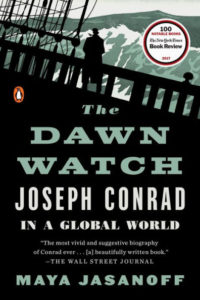 Having read all of Patrick O’Brian, plus his biography (see LymeLine, Feb. 22, 2018), and having read most of that other great author of sea stories in the 20th Century, Joseph Conrad, it was only natural to launch into this latest study of him by Harvard’s Maya Jasanoff.
Having read all of Patrick O’Brian, plus his biography (see LymeLine, Feb. 22, 2018), and having read most of that other great author of sea stories in the 20th Century, Joseph Conrad, it was only natural to launch into this latest study of him by Harvard’s Maya Jasanoff.
Josef Teodor Konrad Korzeniowski was as compulsive a reader as O’Brian, but this Pole added global travel to his years. Born to Polish parents in the Ukraine in 1857, he followed his banished father to Nizhny Novgorod in Russia (this city was where Count Alexander Rostov ended in Amor Towles’s A Gentleman in Moscow: see my review in LymeLine, Dec. 17, 2017!), he returned to Poland, then went to sea from France and ended an English gentleman and author.
Jasanoff’s thesis is that, “Conrad watched the emergence of the globally interrelated world …” first from Eastern Europe, then from various sailing ships in the Far East and Africa, and finally from southern England. While early on he was “obsessed with becoming a sailor” he also found that, “in books he could travel the world.” For a life at sea, Conrad wrote “There’s rarely something to look at, there’s always something to see. People are always asleep, people are always awake. You’re never alone, you’re always isolated.”
Two delightful bits that recalled to me my few years at sea: (1) “Having matured in the surroundings and under the special conditions of sea life, I have a special piety toward that form of my past …” and (2) “For utter surrender to indolence you cannot beat a sailor ashore when that mood is on him, the mood of absolute irresponsibility tasted to the full.”
Jasanoff concludes thus with her linkage of Conrad to our increasingly interconnected world, “What Conrad had made me see, I realized, was a set of forces whose shapes may have changed but whose challenges have not. Today’s hearts of darkness are to be found in other places where civilizing missions serve as covers for exploitation. The heirs of Conrad’s technologically displaced sailors (steam replacing sail) are to be found in industries disrupted by digitization. The analogues to his anarchists are to be found in Internet chat rooms or terrorist cells. The material interests he centered in the United States emanate today as much from China.”
So perhaps it was only natural that I turned again to Conrad himself in A Personal Record, first published in 1908 when he was 50-years-old. Some jewels:
“It is better for mankind to be impressionable than reflective. Nothing humanly great—great, I mean as affecting a whole mass of lives—has come from reflection.”
“Only in men’s imagination does every truth find an effective and undeniable existence. Imagination, not invention, is the supreme master of art as of life. An imaginative and exact rendering of authentic memories may serve worthily that spirit of piety toward all things human which sanction the conceptions of a writer of tales, and the emotions of the man reviewing his own experience.”
And, of course …
“Books are an integral part of one’s life.”
Editor’s Note: ‘The Dawn Watch: Joseph Conrad in a Global World’ by Maya Jasanoff was published by Penguin Press, New York, 2017.

About the Author: Felix Kloman is a sailor, rower, husband, father, grandfather, retired management consultant and, above all, a curious reader and writer. He’s explored how we as human beings and organizations respond to ever-present uncertainty in two books, ‘Mumpsimus Revisited’ (2005) and ‘The Fantods of Risk’ (2008). A 20-year resident of Lyme, he now writes book reviews, mostly of non-fiction, which explores our minds, our behavior, our politics and our history. But he does throw in a novel here and there. For more than 50 years, he’s put together the 17 syllables that comprise haiku, the traditional Japanese poetry, and now serves as the self-appointed “poet laureate” of Ashlawn Farm Coffee, where he may be seen on Friday mornings. His late wife, Ann, was also a writer, but of mystery novels, all of which begin in a village in midcoast Maine, strangely reminiscent of the town she and her husband visited every summer.